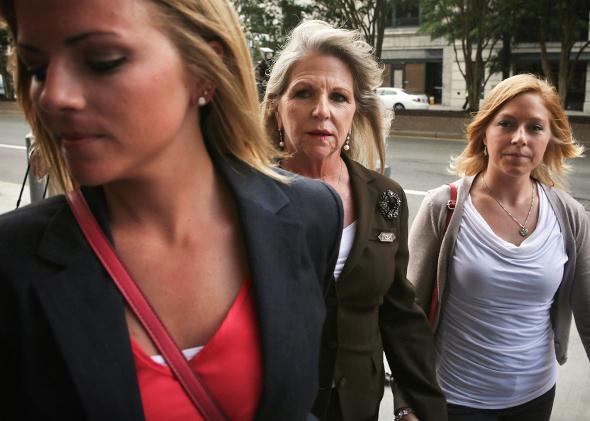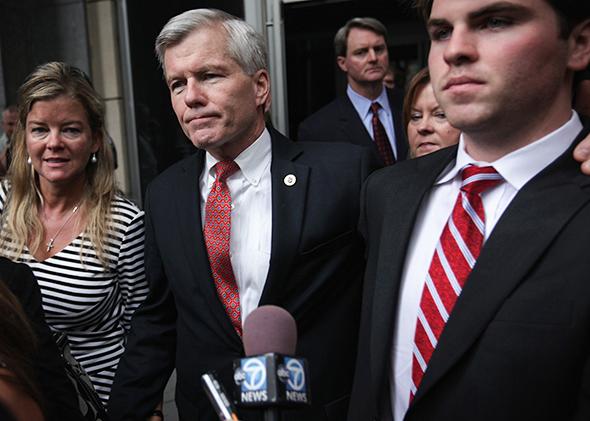We may never fully know what led a Virginia jury to find former Gov. Bob McDonnell guilty on 11 counts of federal corruption and his wife, Maureen, guilty of nine counts. The federal investigation, indictment, and trial at first seemed something of an overreach, and right to the end, it seemed like the case might have been difficult to prove to a jury. After the trial ended in such a brisk and crushing verdict, it now seems easy to say the result was inevitable. If it was never perfectly clear that the prosecutors found the quid to the pro quo, well, in the end it didn’t matter. After weeks of trial, the jury seemed to want nothing more than to loofah off the filth and go home.
The McDonnells were indicted on 14 counts of conspiracy, bribery, and extortion for allegedly taking more than $177,000 in gifts, junkets, and cash from Jonnie Williams. He was the dodgy head of a company that made a tobacco-derived dietary supplement called Anatabloc, and he wanted the governor to push his products. The seven men and five women of the jury heard from 67 witnesses over a trial that lasted five weeks, during which time the former governor and his wife slept at separate residences, entered the courtroom through separate doors, and sat at separate defense tables, while offering up a joint defense.
If I never hear the phrase “X threw Y under a bus” again, especially with regard to this trial, I will be immensely grateful. At some point in the proceedings, it seemed as if there were so many people thrown under so many buses—wife, children, executive chef, staff—it wasn’t clear the bus could move anymore. Maureen McDonnell acceded to a legal strategy that painted her as a frosty harridan with a roving eye and a lamentable inability to manage the staff (the “Downton Abbey defense”). I still cannot accept the defense’s proposition that she was somehow driving the bus when it looked to the rest of the world like she was lying under it.
It’s easy to say that everyone in power is bought and that the McDonnells simply got caught getting bought. But that doesn’t quite capture the horror of what happened here in the commonwealth in the past month. Whatever shame they brought on the office of governor by their dealings with Williams was overshadowed by the shame of their legal strategy. The jurors must have felt unimaginably filthy listening to gruesome tales of a “nutbag” first lady, rebuffed letters from the governor trying to resolve marital spats, and tween-grade text messages to a man Maureen McDonnell was allegedly “obsessed with.” That the former governor knew his career was making his wife wretched and drove on nonetheless is one thing. That he blamed her wretchedness for wrecking his career borders on felony chutzpah.
Maybe the defense strategy that the McDonnells could never have colluded because they didn’t speak was the only defense they had. But that’s their own fault. Prosecutors had offered the former governor a deal that would have had him plead guilty to a single count of fraud and would have spared his wife. The defense on display this month wasn’t the best bad option. It was the worst bad option. And it clearly wasn’t convincing. As Amy Davidson notes, you can be in a miserable marriage and still collude to take cash in exchange for pushing dietary supplements.

Photo by Alex Wong/Getty Images
As the jurors begin to talk, we may begin to get some insight into why they came down so hard on the former first couple. But one possibility is that you just can’t explain lies with lies. And the McDonnell strategy always seemed to be just that: “We couldn’t have been lying to you about our finances, Virginia, because we were too busy lying to you about everything else. We lied about our marriage for years. We lied about our values and our integrity. We lied about our political and economic convictions. We lied about the centrality of family and marriage to our vision of governance.” In the end, when the jurors were asked to believe one more lie—that the McDonnells’ whole life was an “act” (a lie that may or may not now come true, if the McDonnells’ marriage fails to survive this spectacle) to explain the other lies—it may have been too much to sanction.
Nothing about this spectacular political fall is good news. The commonwealth of Virginia has had to watch as the nation snickered at the naive belief in “the Virginia way,” a marriage is likely ruined, five children are shattered, and the public certainty that government is unfixable and contemptible has a new Exhibit A.
Maybe the verdict will generate some interest in the Virginia General Assembly about fixing state ethics laws. But probably not. Maybe those of us who feel sorry for the McDonnells, because greed and unhappiness are human and everyone makes mistakes, should recognize that our prisons are full of good people who also made mistakes. And maybe husbands and wives in America can agree, for future reference, that if “for better or for worse” means anything, it means not eviscerating each other in public. It’s hard to know whether the jury was more bothered by the corruption allegations or about the lies spun to excuse them. But if the McDonnell trial can achieve the demise of the “don’t blame me for my greediness, it’s my crazy wife’s fault” defense, whether used legally or at happy hours, we should perhaps all be grateful.
